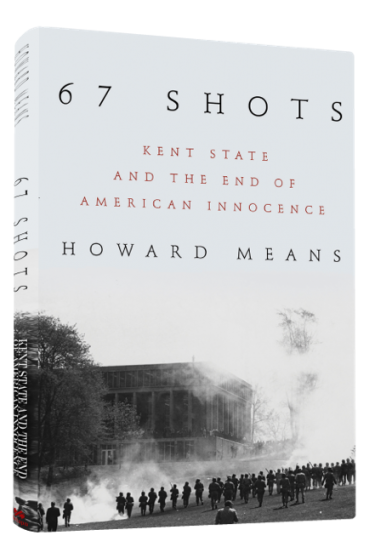67 SHOTS
Kent State and the end of American Innocence
by Howard Means
Hardcover: 288 pages
Publisher: Da Capo Press
(April 12, 2016)
Language: English
ISBN-10: 0306823799
ISBN-13: 978-0306823794

67 SHOTS
Kent State and the end of American Innocence
by Howard Means
Hardcover: 288 pages
Publisher: Da Capo Press
(April 12, 2016)
Language: English
ISBN-10: 0306823799
ISBN-13: 978-0306823794
by Howard Means
Monday morning, May 4, 1970, found Kent State a place strangely divided against itself: part university, part military installation; a school where students were encouraged to gather in classrooms but prohibited from doing so on the campus Commons. Professors preached caution, or encouraged opposition to authority, or in some cases even tried to lead it. Top administrators fretted over what was to come—President White had called a 7:00 a.m. meeting of his cabinet and an eight o’clock one with the executive committee of the faculty senate. Then, shortly after the conclusion of a 10:00 a.m. gathering with National Guard commanders, White and his brain trust left for an off-campus luncheon meeting. By then, the only certainty seemed to be that thousands of Kent State students would be swept up—by intent, circumstance, or proximity—in a noon rally that the National Guard clearly had no intent of allowing.
“Guards were there in front of the buildings, on the street,” Joseph Sima, then a junior, remembered of school that morning. “They had bayonets on their rifles. I had a class in Bowman Hall, and I had a Guardsman right outside the door. And it was like that in many of the classes.”
Barclay McMillen was among the teachers advising caution. A Kent State alumnus, McMillen served as a legal advisor to President White and a lecturer in the political science department. He devoted the entirety of his 9:00 a.m. American government class to the activities of that weekend and to the coming noon rally.
“The Governor has assumed legal control of this university and has prohibited all forms of outdoor demonstrations or rallies, peaceful or otherwise,” he told his students. “We’re under martial law on this campus. As for students who might be tempted by simple curiosity to join the rally, “When your head is busted or when you are arrested or when you’re tear-gassed, you have only yourself to blame.”
The class was audio-taped by the campus radio station, WKSU, and aired in its entirety beginning at 11:00 a.m. The broadcast ended almost at the exact moment when General Robert Canterbury began deploying his National Guard troops from their position on the grounds of the burned-out ROTC building.
Diane Yale-Peabody’s class on the modern short story met at 11:55 a.m., just as McMillen’s rebroadcast class was ending and five minutes before the protest was to begin. “When I got there, the professor said he knew there was a rally going on, so anyone who wanted to leave class that day and go to the rally, he would not mark them down as being absent. Or if the people who stayed in class would rather talk about the story we were studying at that time, we would do that. We all agreed we were there to learn about this course, so we talked about the story.”
At the same time, Jim Vacarella and as many as fifty other students, by his account, were crammed into his dorm room, preparing for the rally by doing joints. “That was very interesting,” he said in a 2000 interview, “getting a downer drug and then going out there to fight an upper war. That morning, I had a feeling that something was really wrong.”
Dean Kahler, who had turned twenty on May 1, took a far more measured approach to the day’s possibilities: “We’d all heard that there was going to be some kind of a rally at noon, and being a farm boy, I didn’t have time to go to civil rights marches or antiwar rallies. So I was curious. There was a second thing, too: if I could lend my voice to stopping the expansion of the war, I was hoping something like that would come out of it.”
Kahler decided not to go to classes Monday, but he did call all his professors that morning to tell them he wouldn’t be there and to find out what assignments he would be missing. “My zoology professor basically told me to relax and try not to get too close to the Guard and not do anything stupid, so I listened to him.” Kahler would be in the crowd but well away from the action when he was shot in the spine.